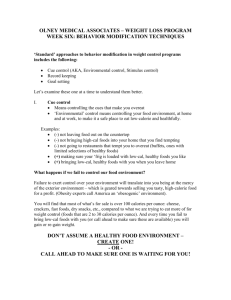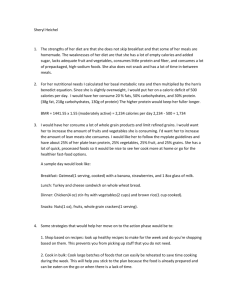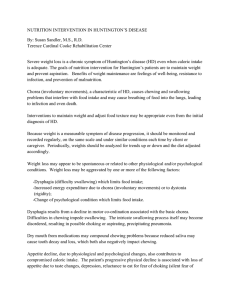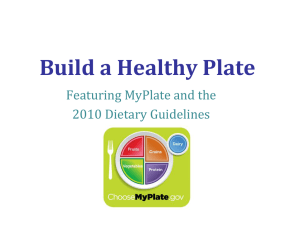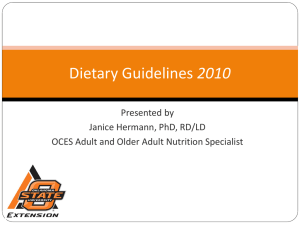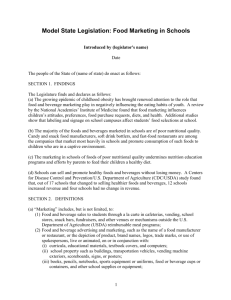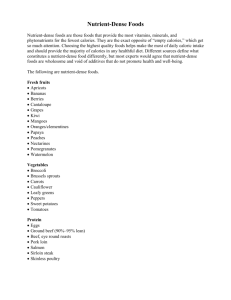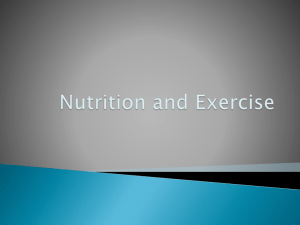Dietary Guidelines P..
advertisement
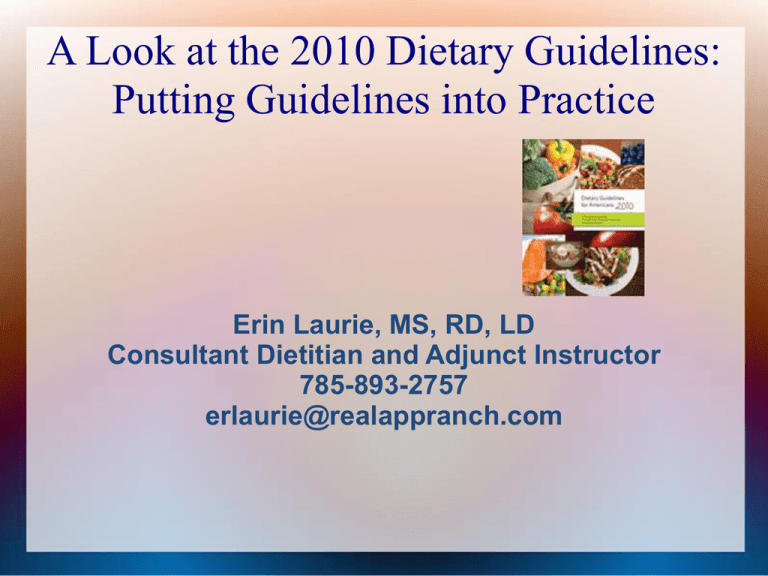
A Look at the 2010 Dietary Guidelines: Putting Guidelines into Practice Erin Laurie, MS, RD, LD Consultant Dietitian and Adjunct Instructor 785-893-2757 erlaurie@realappranch.com 2010 Dietary Guidelines: A New Perspective DG Advisory Committee used Nutrition Evidence Based Library – Nutrition Evidence Library Targeted toward an overweight and obese population Contains a “Call to Action” including changes to food environment; expanding nutrition education; access to fruits and vegetables, and healthful products Overarching Themes 1. Maintain calorie balance over time to achieve and sustain a healthy weight. 2. Focus on consuming nutrient-dense foods and beverages Key Recommendations with Evidence Balancing Calories to Manage Weight Foods and Food Components to Reduce Foods and Nutrients to Increase Building Healthy Eating Patterns Balancing Calories to Manage Weight Calories in vs. Calories Out Balancing Calories to Manage Weight Increase intake of whole grains, vegetables, and fruits Reduce intake of sugar-sweetened beverages Monitor intake of 100% fruit juice for children Monitor calorie intake from alcoholic beverages Top Calories Consumed Children ages 2-18 Adults 1. Grain-based desserts 1. Grain-based desserts 2. Pizza 2. Yeast breads 3. Soda/Energy/Sports Drinks 3. Chicken/Mixed Dishes 4. Yeast breads 4. Soda/Energy/Sports Drinks 5. Chicken/Mixed Dishes 5. Alcohol Balancing Calories to Manage Weight Focus on the total number of calories consumed Monitor food intake Choose smaller portions, especially high calorie foods Eat a nutrient-dense breakfast Physical Activity 2008 Physical Activity Guidelines for Americans – 2008 Physical Activity Guidelines Link Adults: 150 minutes of moderate-intensity aerobic activity each week. Children: 60 minutes or more each day Ages 2-5 no specific recommendations- play actively several times each day Foods and Food Components to Reduce Sodium- What is the estimated average sodium intake? Fats- Saturated, Trans Fats, Cholesterol Solid Fats Added Sugars Saturated fat and added sugars no more than 5-15 percent of calories Foods and Food Components to Reduce Refined Grains Provide some vitamins and minerals Commonly provide excess calories • Many high in added fats and/or added sugars Alcohol Women- Up to 1 drink per day Men- Up to 2 drinks per day Foods and Nutrients to Increase Vegetables and Fruits Whole-Grains- ½ grains Fat-Free and Low-Fat Milk and Milk Products Balance in Protein Foods Seafood Replace some saturated fats with unsaturated fats © 2009, General Mills, Inc. Parts of a Grain © General Mills 13 Nutrients of Concern Potassium Fiber Calcium Vitamin D Iron- women of childbearing years/pregnant Folate- women of childbearing years/pregnant B12 – Americans over 50 Building Healthy Eating Patterns Focus on nutrient-dense foods Remember that beverages count Follow food safety principles Consider the role of supplements and fortified foods Vitamin D Folic Acid Vitamin B12 Iron supplements for pregnant women Helping Americans Make Healthy Choices Everyone has a role in the movement to make America healthy. – Influencers of Food Choices Call to Action 1. Ensure that all Americans have access to nutritious foods and opportunities for physical activity 2. Facilitate individual behavior change through environmental strategies. 3. Set the stage for lifelong healthy eating, physical activity, and weight management behaviors. Thoughts for Consideration If DGA are viewed as all-or-nothing goals, little room to embrace or celebrate small changes Consumer messages around nutrition and especially weight loss need to be simple and focused on specific population groups. The “one size fits all” consumer message leads to confusion and noncompliance. Resources Dietary Guidelines: www.dietaryguidelines.gov – Consumer Materials available on or before April 27 International Food Information Council:www.foodinsight.org MyPyramid: www.mypyramid.gov DASH Eating Plan: http://www.nhlbi.nih.gov/health/public/heart/hbp/dash/new_ dash.pdf Bell Institute of Health and Nutrition:www.bellinstitute.org American Dietetic Associationwww.eatright.org

